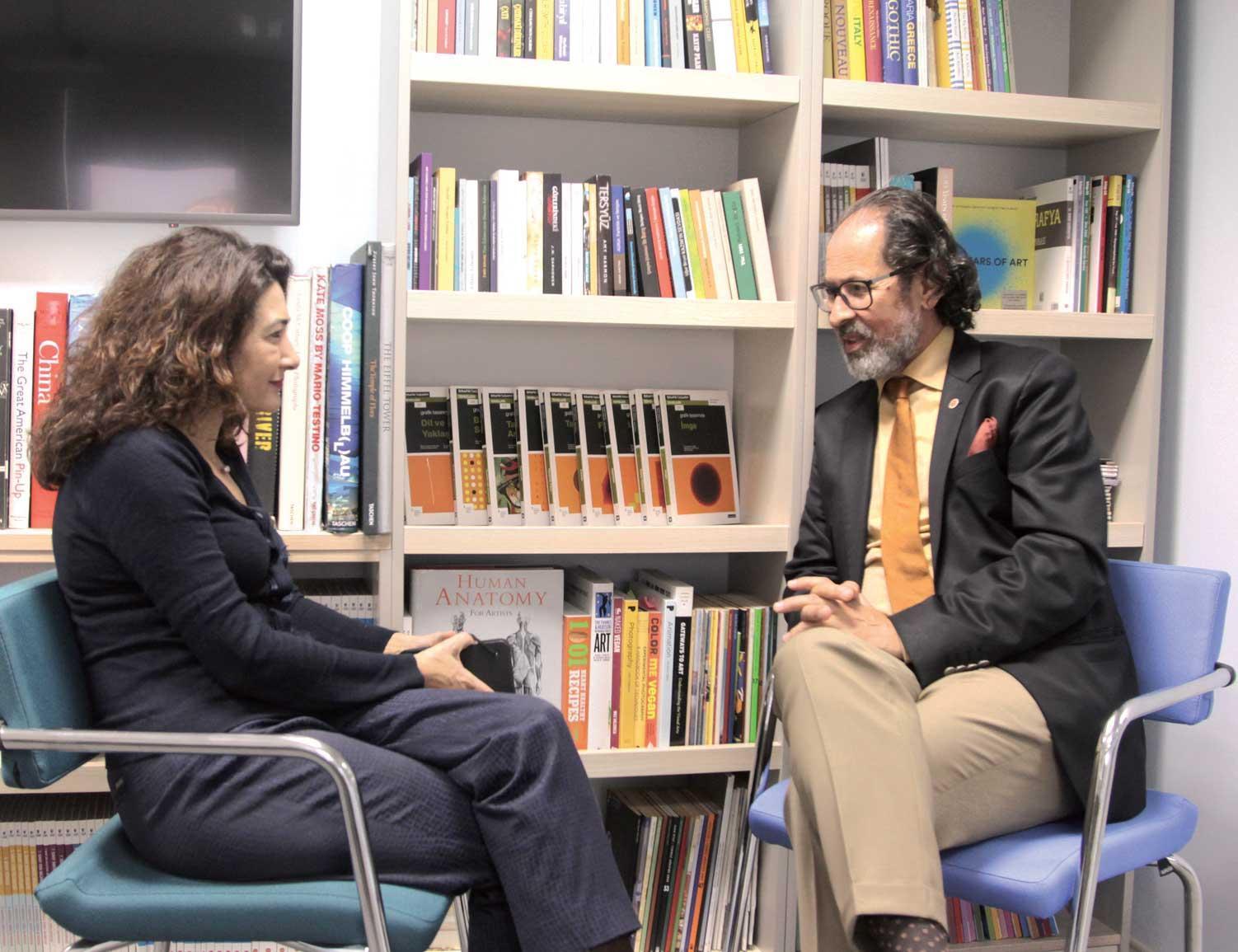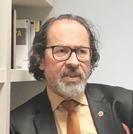Idea that ‘Turks don’t read’ is an urban legend: Top publisher
Barçın Yinanç - barcin.yinanc@hdn.com.tr

Turkey’s publishing sector is one of the few that has experienced constant growth despite a lack of state support, today ranking as the 11th largest in the world, according to publisher Kenan Kocatürk.
In 2016, 8.4 books per person were printed on average and several authors routinely sell thousands of books, Kocatürk told the Hürriyet Daily News in an exclusive interview.
“The idea that ‘Turks don’t read’ is an urban legend. The numbers speak for themselves,” said Kocatürk, the head of the Turkish Publishers Association and organizer of the Istanbul International Book Fair in conjunction with TÜYAP, which opened its doors over the weekend.
Tell us about the fair. What does it tell us about Turkey’s readership and publishing industry?
This is the 36th edition of the fair, and there is a clear difference between the early years and where we are now. The idea that “Turks don’t read” is an urban legend. The numbers speak for themselves. Some 666,856,579 books were printed in 2016, which amounts to 8.4 books per person. That’s not bad in terms of the world average. Turkey’s book industry is the 11th largest in the world, according to International Publishers Association data. In the first nine months of 2017, there was an increase of 17 percent in the publication of non-fiction books and 5.4 percent in fiction books.We have also seen a notable interest in books fairs, even in more Anatolian cities. Of course, there have been some unfortunate incidents, such as what happened recently in Kayseri, where the writer İhsan Eliaçık was attacked. But several municipalities have started organizing events under the name “fair.”
The difference with the Istanbul International Book Fair is that the Turkish Publishers Association and TÜYAP respect diversity. We never discriminate on grounds of personal dislikes or a perceived negative impact on society. It is a platform where everyone can express their views and exhibit their publications. Even under the state of emergency, an additional gallery has been added to the fair area. There is tremendous interest. More than 600,000 people will visit the fair.
Where does the urban legend come from that we buy books but don’t read them?
Even Umberto Eco says he has not read all the books in his library. Our education system is not based on acquiring a habit for reading. Textbooks are the essential tools for children when they prepare for exams and they tend to get fed up. But those who are exposed to good literature and get familiar with good books are raised in a different world. We usually say in Turkey that youngsters do not read. But the main reader profile in Turkey is the 14 to 24 age group. Women also read more than men in Turkey.
Sabahattin Ali’s novel “Madonna in a Fur Coat” sells 300,000 copies every year in Turkey. Classics don’t sell this much anywhere in the world. Turkey has more than 100 authors who have at least 20,000 copies of their books printed, and I know more than 15 authors for whom this figure is as high as 100,000.
How does the publishing sector reflect the polarization of society?
At some fairs or festivals in Turkey local administrators or mayors enact certain codes. Usually municipalities that identify themselves as conservative allow only conservative publications to participate in their fairs. We find this wrong. They exclude writers and publishing houses for political or religious reasons. This not only harms cultural diversity but entrenches polarization. The reader has the right to make an individual choice. Imposing restrictions on those choices should not be the work of the fair organizer or local administrator. The Istanbul Book Fair embraces pluralism.
Has this kind of discrimination always been there or is it a new phenomenon?
It is an upward trend. Significant changes came in the wake of the Gezi Protests in 2013. But on the whole the more discriminative fairs tend to be less successful. Fairs should safeguard Turkey’s cultural diversity. Their platforms should sustain “diversity in unity.”
What effect has the ongoing state of emergency had on the sector?
In the last nine months there has been a drop in the production of books in the education sector. But that is also due to uncertainty. In the space of just one night the state decided to abolish Transition from Primary to Secondary Education [TEOG] exams. So all books on the subject immediately became garbage. Shortly after that the national university entrance examinations were also abolished. The number of books affected was 100 million, which amounts to $200 million in imported paper. Next year it will be difficult to maintain our position as 11th largest book industry in the world.
Meanwhile, a total of 26 publishing houses, most of which are accused of having links to the Fethullahist Terror Organization [FETÖ], have been closed down. Many of these publishers houses were responsible for producing educational textbooks or reference books. But other printing houses such as Evrensel, which has absolutely no relation to FETÖ, have also been closed.
In addition, many academics have been suspended from their university posts. Some had been writing books and others had been translating books. We face some problems in the translation sector, especially with regard to academic books. In addition, the fact that the dismissed academics no longer lecture in universities means a drop in the sales of books they used in their teachings.
Many publishers have adopted cautious and defensive attitudes, resorting to self-censorship. So the state of emergency measures certainly hinder freedom of expression. The situation is often arbitrary: One day we may suddenly find out that certain courts have issued a ban on certain books but the publisher remains totally unaware of the decision.
What is the dimension of the practice of banning books?
Right now they appear to be isolated cases. But one court in an Anatolian town has used anti-terror laws to ban a book simply because that book was found in the house of a suspected terrorist. The book had the word “Kurdish” written on it. The publisher was kept in the dark throughout this process. The book had been on the market for more than a year and there was no official legal proceeding. If a court somewhere thinks a book should be banned then that is what happens. This is a worrying state of affairs.
Has this year’s fair attracted more international interest because of the human rights criticisms currently levelled at Turkey?
Ours is the biggest fair in Europe that caters directly to the reader. Obviously there are some who do not want to visit Turkey for security reasons or negative images in the media. But the number of participants has not declined. I have not encountered anyone who came last year but decided against coming this year.
Tell us about South Korea, the guest country.
We have tremendous similarities in terms of our approach, though their publishing sector is bigger, and their readers more voracious. We aim to expand our cooperation.
Why is the sector getting bigger when many predictions say digital material will soon replace printed material?
The Turkish economy has grown. Lots of shopping malls with bookstores in them have opened. Some mistakes have also been made. Although the Education Ministry was right to start providing text books free of charge, the move brought about the closure of many book stores in Anatolia, as publishers chose to distribute books via cargo companies instead of book stores. The government could have provided Anatolian bookshops with some tax relief, but unlike the construction sector we haven’t received a penny of support from the government. On the contrary, we have faced obstructions. It is forbidden for publishing houses to enter schools, for example, because the government says material provided by the ministry is sufficient. But you cannot educate people with textbooks alone. What’s more, we need more city libraries, as libraries always enhance reading habits.
WHO IS KENAN KOCATÜRK?
Kenan Kocatürk first entered the publishing sector in 1977. He established the Literatür Publishing House in 1988 and cooperated with international publishers involved in the English textbook market.

Several foreign academic textbooks have been published in Turkish by Kocatürk’s companies and he was among the first to set up bookstores in university campuses.
Kocatürk became one of the founders and executives of Punto Book Services in 2007, which became active in the distribution of books. In 2016 he was involved in the establishment of the companies “Hep Kitap” and TEAS Press and he is currently the head of these two publishing houses.
Kocatürk has been on the board of directors of Turkish Publishers Association since 2003 and has been the president of the board of directors since April 2007.
















